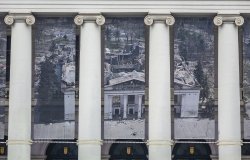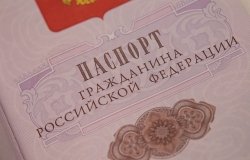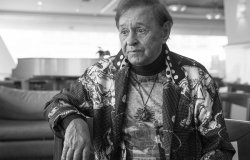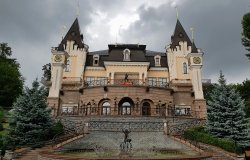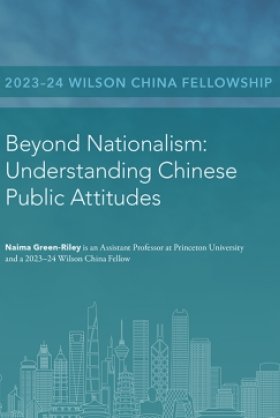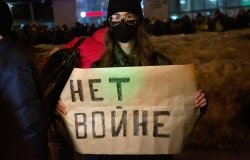Citizenship, Inclusion, and Inequality in the Soviet Union: An Interview with Title VIII Research Scholar Anna Whittington
Anna Whittington is a Title VIII Research Scholar with the Kennan Institute focusing on Soviet citizenship and identity. We asked her to tell us more about her research on inclusion, inequality, and ethnicity in the USSR.

Q: Describe your background and what brought you to the Wilson Center.
I am a historian by training and I focus on citizenship and inequality across Soviet Eurasia. I’ve been studying the former Soviet Union in some capacity for more than 15 years now, but my current research really took shape at the University of Michigan, where I earned my Ph.D. in 2018. I am coming to the Wilson Center from a two-year postdoctoral fellowship at Washington University in St. Louis, and, before that, a research position at the International Centre for the History and Sociology of World War II and its Consequences at the Higher School of Economics in Moscow. I have spent considerable time living, working, and traveling in the former Soviet Union, making my way to 14 of the 15 former republics (all but Turkmenistan), and I’ve spent a lot of time immersing myself not only in Russian, but also regional languages, especially Ukrainian, Armenian, Uzbek, and Kazakh.
I am excited to be based at the Wilson Center this summer (and to return next summer!). Besides the amazing community of scholars and former fellows who have been affiliated at the Kennan Institute specifically and the Wilson Center more generally, I am looking forward to research opportunities in the greater D.C. area, particularly as I start to pivot from my first book project, on the discourses and practices of Soviet citizenship, to my second, on censuses in the Russian Empire and Soviet Union. The fellowship will enable me to pursue comparative angles about censuses in the U.S., which I became especially interested in when I worked as enumerator in the 2020 U.S. Census. My affiliation at Kennan will enable me to immerse myself in sources available at the national archives and the Library of Congress. I am also eager to communicate my research and knowledge to the larger community of scholars, policymakers, and practitioners in the D.C. area.
Q: What project are you working on at the Center?
I’m working on two projects at the moment. I am currently most focused on finishing my first book, Repertoires of Citizenship: Inclusion, Inequality, and the Making of the Soviet People, which is based off my 2018 dissertation. The book looks at the discourses and practices of Soviet citizenship, focusing on the ways leaders fostered Soviet identity through concepts like “the Soviet people” (sovetskii narod) and policies to include minorities, and how citizens responded. In this book, I demonstrate that leaders promoted a Soviet identity that transcended ethnicity and emphasized citizens’ active involvement beginning shortly after the revolution. People across a wide geographic and cultural spectrum embraced this identity, even as various disparities affected claims to and participation in citizenship. As I show, inclusion and inequality were both fundamental to how citizens experienced and performed identity. I’m currently working on the manuscript, particularly the first and final chronological chapters, which look at the first two decades and final decade of Soviet rule, respectively—basically, on the origins and fate of Soviet civic identity.
As time permits (and particularly when I return next summer), I also have another project underway, tentatively titled A Mirror for Society: Censuses in the Russian Empire and Soviet Union, which takes my research into Soviet citizenship in a more quantitative direction by focusing on censuses conducted between 1897 and 1989. I am particularly interested in censuses because, alongside schools, they were really one of the few truly universal institutions for all citizens. In this project, I am especially interested in how the Soviet state (and the tsarist empire before it) communicated the census process to the various groups living within the country, and how technological developments changed the value and application of census data.
Q: How did you become interested in your current research topic?
During the 15 months I spent abroad as an undergraduate, I traveled extensively in the former Soviet Union, including the Baltic Region, Ukraine, and Central Asia, as well as in provincial Russia. While I obviously noticed profound differences in all the places I visited—different languages, cultures, foods, historic architecture, geography—I was also struck by the shared history and culture that drew all these places together. Let me give a few examples: pretty much everywhere I traveled, I could speak Russian. Of course, I sometimes encountered hesitancy and reluctance to speak Russian, and sometimes it wasn’t as useful for speaking with people of my generation, many of whom preferred English, but still, I found it generally easy to get around with Russian. I also found a shared urban geography. Each city I saw, whether in Estonia or Kazakhstan, was different, but most had a collection of similar Soviet-era monuments, buildings, and apartment complexes, at least somewhere in a city. If I found myself out and about on a Saturday, I would see many couples taking their wedding photos at various urban monuments, particularly World War II memorials. Finally, when I talked with locals, particularly those who had grown up in the Soviet Union, I was also struck by a larger sense of the shared experience of being a Soviet citizen. Not everyone spoke highly of their experiences, yet most had found some way to live in Soviet conditions.
As I began to immerse myself in scholarship on Soviet history, I found that the current trends in scholarship—particularly the focus on “Soviet nationalities policy” that took off in the early 2000s—well accounted for the differences between places but said little about what drew them together. I was also struck by the degree to which scholarly literature, especially on ethnic questions, tended to see the Soviet Union as a failed experiment, reading the Soviet Union’s collapse onto not only the late Soviet years but also earlier eras. The twentieth century, it seemed to me, was an extremely unstable period globally, and 70 years of existence didn’t seem so much a failure as a triumph, especially not when I thought about how many people narrated their lives to me in conversation.
My work tries to address these scholarly shortcomings, considering how Soviet leaders tried—often successfully!—to forge a distinct Soviet identity, and how citizens engaged with this identity, in ways that both reflected and challenged official discourses. I am deeply influenced by the dozens of scholars who turned long-overdue attention to the ways that Soviet leaders forged distinct ethnic identities, which, I demonstrate, were foundational to conceptions of Soviet citizenship. I devote significant attention to the ways ethnic and civic identities often informed one another. At the same time, I do not pretend this balance always worked: much of my work illustrates that, despite a radical program to promote equality and inclusion among citizens, the Soviet Union was plagued with inequalities, particularly relating to ethnicity, which ultimately undermined the larger Soviet project.
Q: Why do you believe that your research matters to a wider audience?
In the United States, we tend to think of the Soviet Union through a pretty negative lens, concentrating on all the ways in which it was different from our own society, with particular emphasis on state repression, purges, and the Gulag, which loom large in the popular imagination. This is problematic in two ways. First, it often assumes a Soviet Union that was unchanging and monolithic, when in fact the Soviet Union changed a lot over time and place. Second, while repression was no doubt a reality for most if not all Soviet citizens, focusing exclusively on what was “wrong” with the Soviet Union doesn’t do much to tell us why the country managed to exist so long, nor why many people continue to be nostalgic for some aspects of Soviet lives. My work generally contributes to longstanding scholarly conversations that normalize the Soviet Union. Like Americans, people identified as Soviet citizens for a wide variety of reasons, from the history they learned in school to the places they visited on vacation, from the food they ate to the way they celebrated holidays and weddings. All these practices—and countless more—shaped the ways Soviet citizens experienced and engaged with citizenship.
Q: What is the most challenging aspect of your research?
For me, I think there are two challenges that stem from having many moving pieces. The first is organizational. To date, I’ve spent more than three years conducting multilingual archival research at more than 30 archives and libraries in eight countries for my two projects. I’ve amassed countless notes, including some that are handwritten because some archives didn’t permit researchers to bring a computer into the reading rooms. Keeping track of all the materials I have consulted is a huge undertaking. The second challenge is a narrative one that has been intensified by my multiplicity of research sites and wide-ranging archival research. How do we tell coherent stories without oversimplifying? Both of my book projects cover a long period of history, based on research conducted in many places. Sometimes, I find it difficult to tell a story that is both coherent and accurate, while also taking into account the complexity of experience across the Soviet Union.
Q: What do you hope the impact of your research will be?
Instead of trying to understand why the Soviet Union failed, my research sheds light on why the state managed to endure so long and why it seemed stable up until its collapse. I show that the state developed a powerful and effective discourse of active, participatory citizenship among its populace, which contributed in many cases to a deep identification with the system. In my view, this identification was critical both to the Soviet Union’s longevity and its enduring popularity among many former citizens. The implications are twofold.
First, despite the initial expectations about post-Soviet democratization, authoritarian systems have demonstrated considerable longevity in the region. Although scholars effectively demonstrate how democracy develops and progresses, enduring authoritarianism remains comparatively understudied and poorly understood. A more nuanced understanding of how the Soviet Union developed and maintained an enormous base of public support despite denying citizens the rights and privileges enjoyed in liberal democracies can allow us to explore a new avenue for understanding why undemocratic, repressive systems persist and thrive. Although the Soviet Union ultimately collapsed, the regime utilized participatory citizenship to promote identification with the state, even while denying citizens the freedoms typically associated with “citizenship.” Broadening our understanding of non-democratic practices of citizenship helps us understand the resilience of authoritarianism, a matter of particular relevance in the former Soviet Union, where countries continue to draw on Soviet ideas about citizenship.
Secondly, many former Soviet citizens continue to identify with the Soviet regime to this day, with implications for both domestic policy within post-Soviet countries and international politics more generally. The Soviet experience continues to shape expectations about the role and function of the government in the daily lives of people throughout the former Soviet Union. My research offers insight into the way that ordinary people understand the conditions under which they live. Memories of the past are highly intertwined with experience of the present. These revelations can help us better understand evolving post-Soviet regimes.
The opinions expressed in this article are those solely of the authors and do not reflect the views of the Kennan Institute.
About the Author
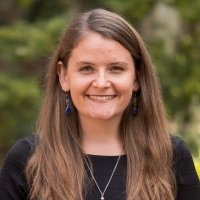
Anna Whittington
Assistant Professor of History, University of Illinois Urbana-Champaign

Kennan Institute
The Kennan Institute is the premier US center for advanced research on Eurasia and the oldest and largest regional program at the Woodrow Wilson International Center for Scholars. The Kennan Institute is committed to improving American understanding of Russia, Ukraine, Central Asia, the South Caucasus, and the surrounding region though research and exchange. Read more



